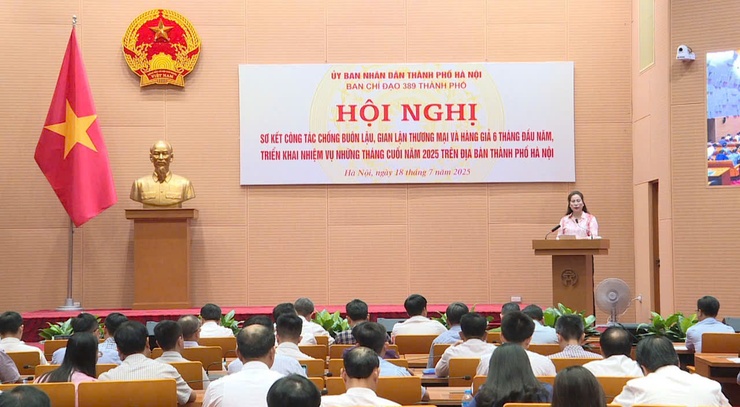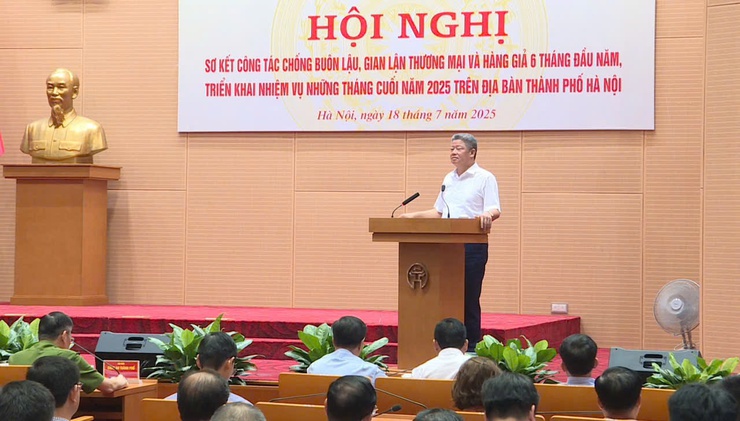According to a report by the Hanoi Steering Committee 389, in the first half of 2025, Hanoi proactively developed and effectively implemented various plans and directives issued by the Government, the Prime Minister, the National Steering Committee 389, the Hanoi People's Committee, and the City's Steering Committee 389.
These measures targeted the fight against smuggling, trade fraud, and counterfeit goods and resulted in timely detection and handling of numerous cases, criminal networks, and violators.

Overview of the event.
Despite these efforts, due to the significant illicit profits involved, smuggling and trade fraud activities remain complex and increasingly sophisticated. In the first six months of 2025, enforcement forces under Steering Committee 389 inspected and handled 9,582 cases and processed 8,542 violations.
These actions contributed over VND2.146 trillion (approximately US$84.4 million) to the state budget. Authorities initiated criminal proceedings for 115 cases involving 170 individuals. The thousands of detected violations illustrate the scale of the problem and the audacity of offenders.
During the 2025 “Action Month for Food Safety,” Hanoi market management officers, working with city police, uncovered several major violations involving unsafe food and counterfeit goods.
Among the most notable cases, authorities seized 14,196 frozen chickens and 560 kilograms of unidentified chicken offal from Xuan Thang Import-Export and Food Trading Co., Ltd. in Le Loi Commune, Thuong Tin District.
They also confiscated 10,566 kilograms of assorted frozen beef products from a business in Phu Xuyen District and 7,543 unauthorized cosmetic and children’s food products carrying foreign brand names such as Hipp, Aptamil, Alete, Nivea, Beauty Baby, L’Oreal, Sensodyne, Denk Mit, and Balea, worth more than VND1.1 billion (about US$43,300).
City police also dismantled a counterfeit health supplement production and distribution ring involving over 100 tons of fake goods, leading to the arrest of Pham Ngoc Tien, his wife Doan Thi Nguyet, and five other suspects.
In addition to common tactics such as setting up multiple businesses at different addresses or operating covertly in remote areas, offenders are adopting more sophisticated schemes, according to Nguyen Kieu Oanh, Deputy Director of the Hanoi Department of Industry and Trade.
A new trend involves importing genuine medicine, stripping away the original packaging, and replacing part of the contents with low-quality counterfeit pills to maximize profits. Oanh warned that this tactic is especially difficult to detect through routine inspections.

Vice Chairman of the Hanoi People's Committee Nguyen Manh Quyen.
Criminals have also replicated packaging, brand labels, and anti-counterfeit stamps from genuine products. Some have even commissioned the printing of aluminum seals and product boxes that are identical to real ones, deceiving consumers and inspectors alike.
At the conference, a representative from Hanoi's Customs Division I highlighted that offenders are using a variety of means, such as air travel, express delivery services, and even mobile delivery apps, to smuggle gold bars, currency, and drugs into and out of the country.
The latter half of the year typically sees a surge in commerce, production, and consumption, creating more opportunities for smuggling and fraud. A representative from the Hanoi Police Department recommended that all relevant forces enhance collaboration, especially in early-stage handling of violations, to support subsequent investigations and enforcement.
Standing Deputy Chief of the National Steering Committee 389 Office, Dang Van Dung, urged the Hanoi Steering Committee 389 to strictly carry out all tasks assigned by the Prime Minister and to treat the fight against smuggling as a continuous, uncompromising effort with no exceptions.
Concluding the conference, Vice Chairman Nguyen Manh Quyen stated that the smuggling and counterfeit goods situation is expected to remain complicated in the months ahead, with increasingly sophisticated tactics that challenge regulatory and enforcement efforts.
In response, city departments, sectors, and local governments are required to innovate and adopt a more proactive approach to tackle these violations. The Standing Office of Steering Committee 389 must coordinate closely with relevant agencies, clearly defining roles and responsibilities, particularly those of organizational leaders, when assigning tasks.
For issues directly affecting public health and safety, including food, pharmaceuticals, and cosmetics, Hanoi’s authorities must enforce the law strictly to protect citizens’ health and interests. The city is also urged to strengthen coordination with border provinces and localities that host airports and seaports to block illegal goods from entering the market.
Hanoi authorities will intensify random inspections in high-risk sectors, including e-commerce, and focus on products that directly affect public health. These include food, medicine, cosmetics, health supplements, and tax-related violations, particularly during holiday seasons and at the end of the year.
The city will also enhance information-sharing among enforcement bodies to stay ahead of new criminal tactics, especially those emerging in cyberspace. At the same time, Hanoi will review existing legal documents and report any challenges to the Standing Office of Steering Committee 389 for recommendation and revision by competent authorities.
Vice Chairman Quyen also requested that ward- and commune-level governments quickly establish local Steering Committees 389 with clear membership structures. These committees should intensify public education efforts to raise awareness and promote a collective refusal to engage in counterfeit trade. In addition, they should support individuals and businesses in brand-building, intellectual property registration, and legal production and trading of products that meet official standards.
He further requested the Office of the National Steering Committee 389 to promptly address Hanoi's proposals regarding loopholes in food safety management and the handling of misleading advertising claims. The central office should also regulate Key Opinion Leaders and Creators (KOL/KOC) by requiring business registration, public disclosure of identity, and legal accountability in advertising activities. Strengthened control is needed at border and customs zones to support Hanoi in its anti-smuggling campaign.
Moreover, he called for the allocation of more resources—both human and technological—to enhance the capabilities of official testing laboratories and designated food safety inspection agencies. These entities should be equipped to control and monitor the quality of goods in circulation, transport and store seized evidence in large-scale cases, and establish specialized storage facilities tailored to the needs of seized goods such as food, cosmetics, and electronic devices.
Finally, the Standing Office of Hanoi's Steering Committee 389 was assigned to work with functional departments to upgrade high-quality inspection centers and equip vehicles for on-site testing of goods during enforcement operations.